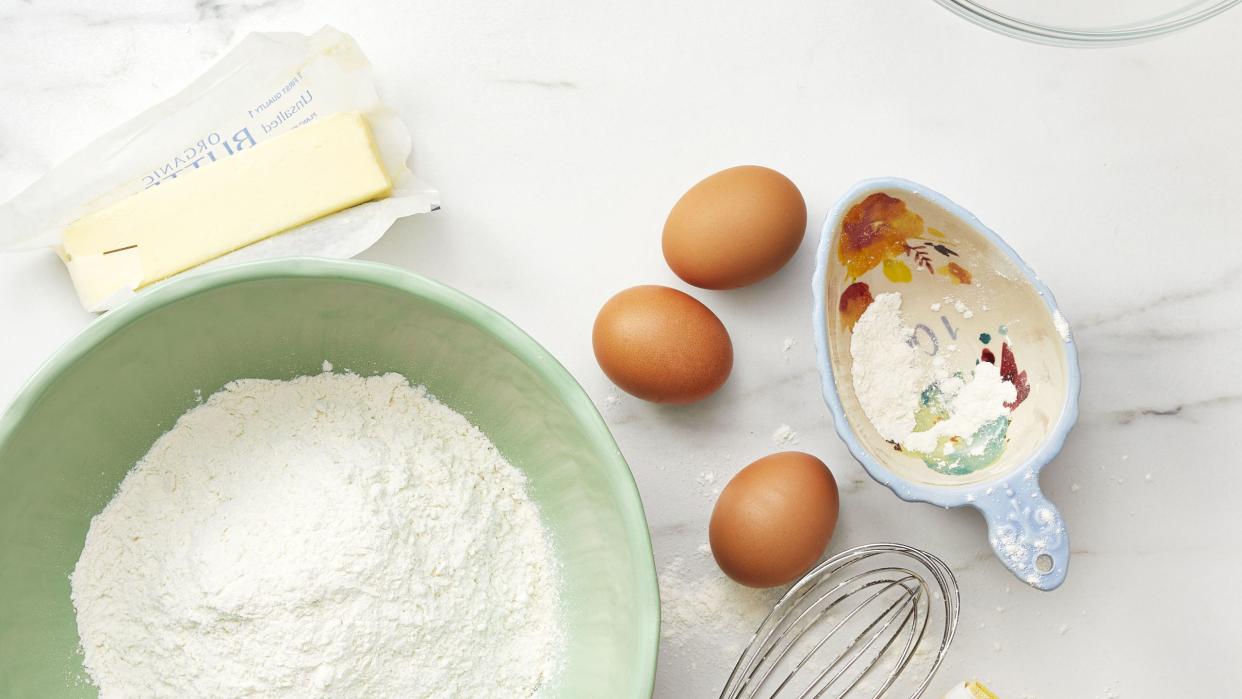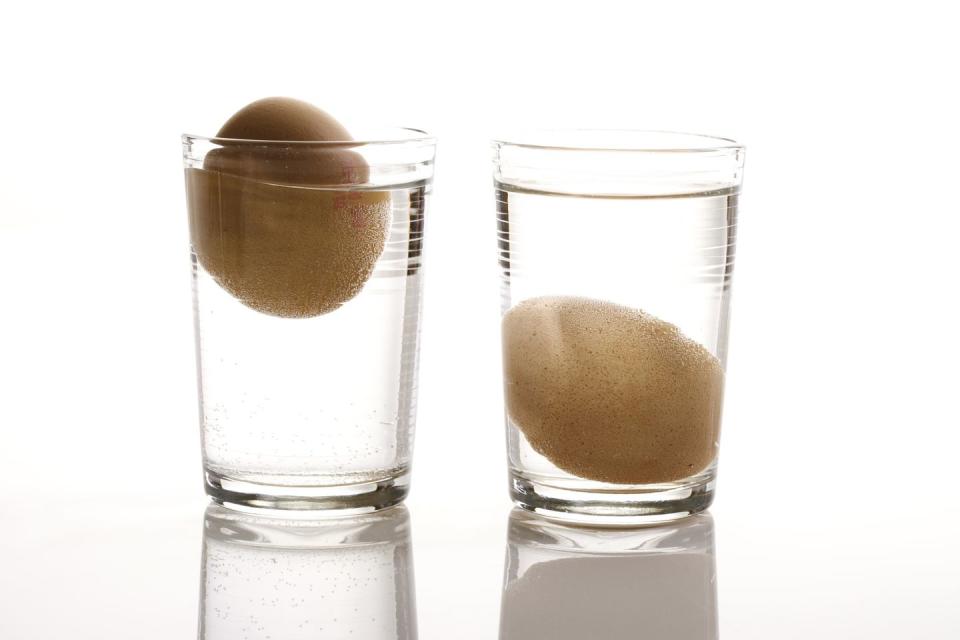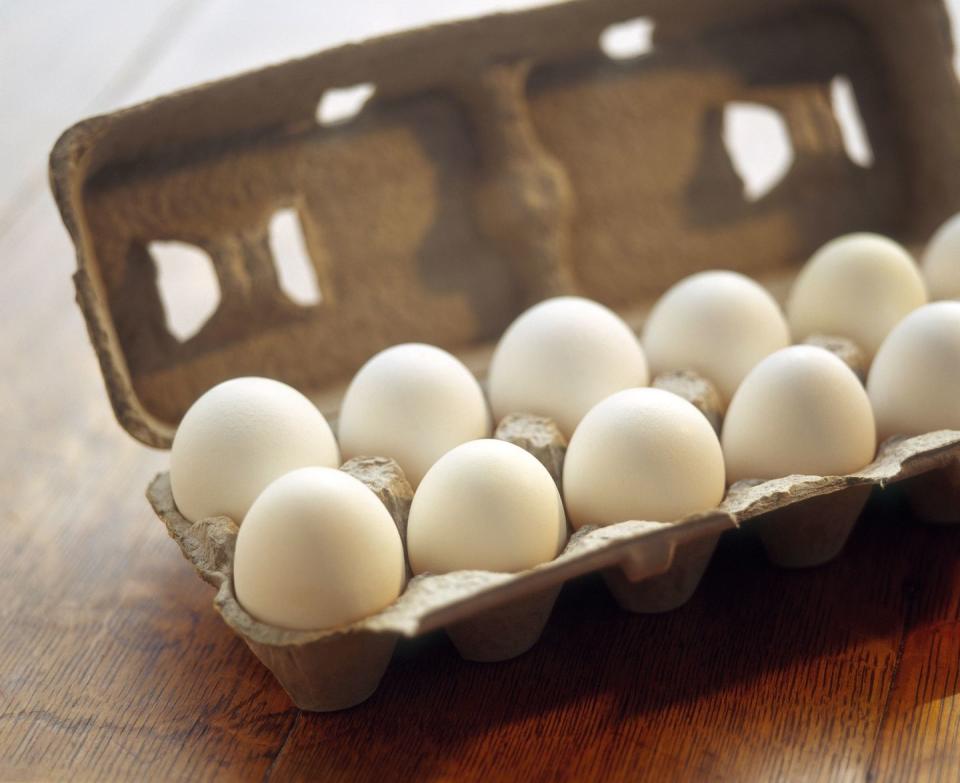Find Out If Your Eggs Are Fresh Using the Handy Dandy Egg Float Test

- Oops!Something went wrong.Please try again later.
Have you ever wondered if eggs go bad? These days, we often store our eggs in the refrigerator, and they're used up quicker than just about anything. Whether it's for baking, breakfast casseroles, or our favorite egg recipes, the incredible, edible egg is one of those kitchen staples that rarely goes unused. But if you happen to have a carton of eggs in the fridge and you're not sure how long they've been there, it begs the question: are these eggs still fresh? Luckily, there's an easy way to tell (and we're not just talking about the expiration date). Instead, you can get a more accurate answer using the egg float test.
What is the egg float test, you might ask? It's like a mini science experiment in your kitchen. All you need is a glass of water! This simple hack can help you find out if your eggs are still okay to eat. Because no one wants to cook with rotten eggs—it's unpleasant; plus, it can put you at risk for salmonella and other food-borne diseases. So how do you know if your eggs are actually expired or if you can squeeze in a few more omelettes?
Read on for everything you need to know. And while you're here, pick up some other tips and tricks, like how to sniff out any problems and what that pack date on the egg carton actually means.
How do you do a float test?

It's pretty simple: Place an egg in a bowl of water. If the egg sinks, it's good; if it floats, it's gone bad. Here's why: Eggshells are very porous, so as time goes by, the egg loses moisture, causing its contents to shrink. At the same time, a small air pocket inside the shell starts to expand, causing the egg to float in water. Give the egg float test a try—here are three possible outcomes:
The egg sinks and falls to its side. Hooray, you have a fresh egg! Now go make Ree Drummond's eggs Benedict.
The egg sinks, but stands upright at the bottom. Get cracking—your egg is still okay to eat, but you should use it relatively quickly.
The egg starts to float up slightly. It's past its peak freshness but might be okay to eat. Check out the sniff test, below!
The egg floats. Sorry, but your egg is no longer safe to eat—it's time to toss it. If you want to double check, crack the egg into a bowl and give it a sniff.
Can you still eat eggs that float?
Not all floating eggs are rotten! According to the USDA, if an egg floats, "the egg is old, but it may be perfectly safe to use." You'll want to crack the egg into a bowl to take a closer look. Use the sniff test and look for anything that seems off about the egg.
How do you know if eggs have gone bad?
If you've already cracked open your eggs, use your senses and your best judgment. Here's how to spy an egg that's past its prime or close to it:
Check the Whites
Fresh eggs will have thick, slightly opaque whites; eggs whites that are older will start to spread. Runny egg whites aren't necessarily unsafe to eat though.
Examine the Yolks
If the yolks are round and domed, the eggs are likely fresh—if they look flattened, they may be on the older side.
Do a Sniff Test
If you've ever smelled rotten eggs, you know what we're talking about here. Rule of thumb: If your eggs smell bad, throw them out!
What if my eggs are old or almost expired?
Don't toss your eggs just because they're close to expiring! Older eggs are actually great for making meringue—they whip up better than fresh eggs. You can also hard-boil older eggs to extend their shelf-life for a little longer. Hard-boiled eggs can be stored in their shells in the fridge for another week. (Just make sure to label them so you don't confuse them with raw eggs!) Then use your hard-boiled to make egg salad, deviled eggs, or Ree's New York-Style Chopped Salad. If worse comes to worse, you can always opt for eggless desserts or using any number of egg substitutes.

What's the pack date on an egg carton?
Your egg carton is probably stamped with a sell-by date or best-by date, but those dates aren't always the answer. Eggs are usually still fresh beyond the sell-by date. For a more accurate date, look at the pack date (sometimes called the Julian date). This three-digit number, which should be stamped on the side of your egg carton, corresponds to the day of the year: 001 is January 1 and 365 is December 31. (Sorry, you're going to have to do some calculating to figure it out!) The pack date tells you when the eggs were washed and placed in the container. Eggs that have been properly refrigerated are generally safe to eat four to five weeks after the pack date.
You Might Also Like

